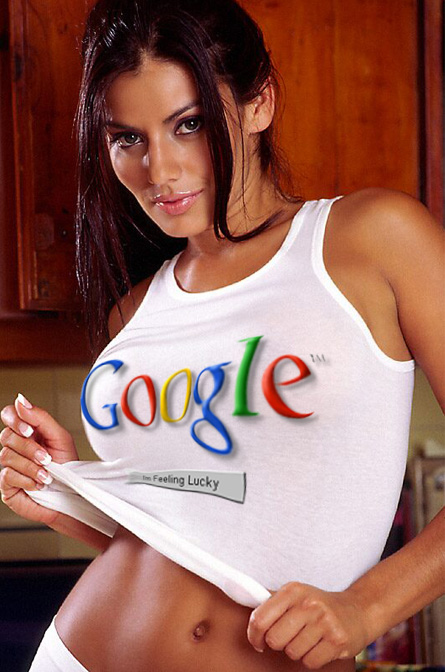GooTube
About a month before the recent round of speculation on YouTube's copyright problems, I posted that YouTube has a shut-off valve.
 Anytime a big media conglomerate (like Universal, for example) is ready, they can kill YouTube off with a couple of burly lawsuits.
Anytime a big media conglomerate (like Universal, for example) is ready, they can kill YouTube off with a couple of burly lawsuits.
Well, that dynamic certainly changes if Google buys Youtube. If the video sharing site is sued by big media, that's David and Goliath. But if Google is sued by big media, that's Goliath vs. Goliath... and in a battle like that is not about ownership or content creation or opensource values, it's about money.
But Google's forced entry into this debate brings up another interesting question - Does Google have a shut-off valve?
 The answer is no, of course. You can't just shut off what Google has. It's too big and powerful. But there's no doubt that they have copyright problems.
The answer is no, of course. You can't just shut off what Google has. It's too big and powerful. But there's no doubt that they have copyright problems.
The kind of problems that turn a "don't-be-evil" information liberator into a backdoor censor.
"Your work is not valuable enough to be protected" is a rather evil position to take. But the legal standard for copyright forces Google to argue exactly that.
These problems are going to get worse as the information Google feeds you becomes a primary source. Right now they are beginning to duke it out with the book publishing industry over book search.
In contrast to Microsoft's strategy, Google is involuntarily crawling books for their booksearch and forcing publishers to opt out, basically telling the industry to F- off or get on board.
Their strategy could work, or it could not. But nobody could say there isn't some risk involved. So, no shut off valve, but maybe a degenerative disease?
What Google has in their back pocket, of course, is that they have totally changed the way we interact with the web. And that they've become a verb... without marketing themselves like a verb (Yahoooo!!!!). "Coke" became a synonym for "soda." When that company's namesake ingredient became illegal, I'm sure a lot of folks speculated that Coca-Cola was on its way out the door.
 Just some food for thought. There's a lot of speculation in the air, and it seemed like an appropriate time to reflect a bit.
Just some food for thought. There's a lot of speculation in the air, and it seemed like an appropriate time to reflect a bit.
All reflection aside, though, the thought of the two biggest copyright disruptors merging must make the courts happy - so here's to judicial expedience.
 Anytime a big media conglomerate (like Universal, for example) is ready, they can kill YouTube off with a couple of burly lawsuits.
Anytime a big media conglomerate (like Universal, for example) is ready, they can kill YouTube off with a couple of burly lawsuits.Well, that dynamic certainly changes if Google buys Youtube. If the video sharing site is sued by big media, that's David and Goliath. But if Google is sued by big media, that's Goliath vs. Goliath... and in a battle like that is not about ownership or content creation or opensource values, it's about money.
But Google's forced entry into this debate brings up another interesting question - Does Google have a shut-off valve?
 The answer is no, of course. You can't just shut off what Google has. It's too big and powerful. But there's no doubt that they have copyright problems.
The answer is no, of course. You can't just shut off what Google has. It's too big and powerful. But there's no doubt that they have copyright problems.The kind of problems that turn a "don't-be-evil" information liberator into a backdoor censor.
"Your work is not valuable enough to be protected" is a rather evil position to take. But the legal standard for copyright forces Google to argue exactly that.
These problems are going to get worse as the information Google feeds you becomes a primary source. Right now they are beginning to duke it out with the book publishing industry over book search.
In contrast to Microsoft's strategy, Google is involuntarily crawling books for their booksearch and forcing publishers to opt out, basically telling the industry to F- off or get on board.
Their strategy could work, or it could not. But nobody could say there isn't some risk involved. So, no shut off valve, but maybe a degenerative disease?
What Google has in their back pocket, of course, is that they have totally changed the way we interact with the web. And that they've become a verb... without marketing themselves like a verb (Yahoooo!!!!). "Coke" became a synonym for "soda." When that company's namesake ingredient became illegal, I'm sure a lot of folks speculated that Coca-Cola was on its way out the door.
 Just some food for thought. There's a lot of speculation in the air, and it seemed like an appropriate time to reflect a bit.
Just some food for thought. There's a lot of speculation in the air, and it seemed like an appropriate time to reflect a bit.All reflection aside, though, the thought of the two biggest copyright disruptors merging must make the courts happy - so here's to judicial expedience.





0 Comments:
Post a Comment
<< Home